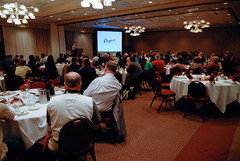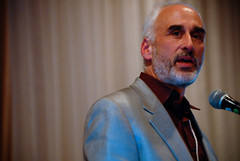The Oregon Bike Summit got officially underway last night with a healthy (and inspiring) dose of perspective.
Attendees gathered in the ball room Red Lion Hotel on the Columbia River (the I-5 bridge loomed in the background) and heard a speech by mountain biking advocate Hill Abell and a listened to a presentation by the City of Portland’s bicycle coordinator Roger Geller.
Abell is the President of the International Mountain Bicycling Association, which has transformed itself over the past decade or so into one of the most powerful advocates for biking in the country. IMBA works with their 85,000 members all over the world to educate people about sustainable trail building and to advocate for mountain bike access.
Besides sharing information about their programs and letting us know that they have plans to open one of their new “IMBA Ride Centers” in Oakridge (south of Eugene) Abell stressed the importance of mountain biking as a “gateway” activity that brings people into cycling.
Abell acknowledged that some folks still don’t see how mountain biking fits into the larger context of the bicycle (as transportation) movement. He quieted that perspective by saying, “As far as we’re concerned, if you ride a bike, you’re a good person.”
Up next was PDOT’s Roger Geller.
Geller was in rare form. I’ve seen him talk numerous times in the past few months, but he brought something extra to the podium last night. His presentation was titled, “Bicycles are the low-hanging fruit,” and his basic premise was that bikes are a simple, cheap solution to many of our complex problems.
Reminiscent of Trek President John Burke’s presentation at the National Bike Summit two years ago, Geller led us through the problems we face as a nation — obesity, climate change, etc… — and than queried the crowd for what could be a solution. With an engaging mix of humor, passion, urgency and optimism, Geller made his case that bikes are the best return on our transportation investment dollar. Or, as he likes to put it, “bikes are a very cheap date.”
After outlining Portland’s impressive successes, he illustrated that all the accomplishments have come via a miniscule investment and that, overall, Portland has done very little in the way of concrete engineering and infrastructure improvements specifically for bikes.
After demonstrating how much has been done with so little, he than laid out a new plan for bike funding over the next 15 years.
Geller’s big idea (and please realize this is not a new PDOT policy, it’s just food for thought)? To raise the money needed to make a significant leap in bicycle mode split (to 25% of all trips), he asks for just $18 per person per year for 15 years — a total of $350 million.
That investment would equate to $150 million for Portland and $20-40 million each for Oregon’s other major cities like Eugene, Salem and Corvallis.
To drive the point home, Geller said that $350 million is just .04% of Oregon’s annual budget, 1.3% of the state’s transportation budget, and that it would buy a mere 800 feet of the proposed $4.2 billion dollar Columbia River Crossing project.
But he warned, “It’s not just about building [infrastructure] for bikes, it’s about reigning in the automobile.” Geller admitted that we cannot achieve our bike-friendly future, without discouraging car use (either through policies or infrastructure).
The crowd securely in his corner, Geller pleaded that now it’s our job to convince decision makers (“those that hold the pursestrings”) that bikes are the low-hanging fruit and they should not think twice about picking them when it comes time to dole out funds.




